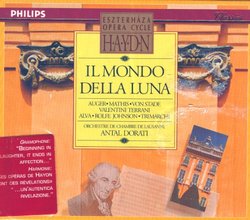| All Artists: Haydn, Auger, Dorati, Lausanne Chamber Orch Title: Il Mondo Della Luna Members Wishing: 0 Total Copies: 0 Label: Polygram Records Release Date: 7/13/1993 Genres: Pop, Classical Styles: Vocal Pop, Opera & Classical Vocal, Historical Periods, Classical (c.1770-1830), Modern, 20th, & 21st Century Number of Discs: 3 SwapaCD Credits: 3 UPC: 028943242028 |
Search - Haydn, Auger, Dorati :: Il Mondo Della Luna
 | Haydn, Auger, Dorati Il Mondo Della Luna Genres: Pop, Classical |
Larger Image |
CD Details |
CD ReviewsFrom the review in Gramophone Record Collector | Mons, Belgium | 12/20/2006 (5 out of 5 stars) ""This reissue of the splendid late-1970s initiative by Dorati, the European Broadcasting Union and Philips--a pioneering achievement of magnitude--is most welcome. All these eight operas were written in a single decade from 1773 (when Haydn was also busy revising, preparing and directing for Esterhaza a mass of operas by other composers): they range from farce to opera seria. If the just criticism is made that, for the most part (though not entirely) characterization is superficial and dramatic structure slack, blame should fall on the conventional (when not downright silly) plots: Haydn did not have Mozart's huge advantage of a da Ponte as librettist, and comparison between the two composers fails to take into account that most of Haydn's operas were written before Mozart's first masterpiece, 'Idomeneo.' On the other hand, what Haydn did provide, in plenty, were superb opportunities for first-class singers; and a great strength of this batch is the very high standard of performance of music that is not only immensely demanding of the artists but extremely attractive to the listener. Another strength is the alert orchestral playing; and a special word is due to the presentation, which is exemplary.
"Several composers had set Goldoni's 'Il mondo della luna' before Haydn, whose third act, however, departs from the original. There had been problems with the casting, for the ranges of three roles had been changed more than once, but he obviously thought well of the music, since no fewer than eight numbers were re-used (as the first movement of Symphony No. 63, as the Benedictus of the Mariazell Mass, and in the flute trios). It is the ladies who are given most of the best music here: Auger in particular shines in her tremendous coloratura 'Ragion nell'alma', but Mathis and von Stade also contribute valuably. Terrani in almost the last of Haydn's castrato roles, however, is less than ideally steady. A special feature of the score is its delicate and unusual instrumentation. This disc comes with an addition which Philips have so far been keeping from us: eight Haydn arias beautifully sung by Mathis with the orchestra under Armin Jordan. In some, the singer is indignant or cynical about the deception of men, and of these the lovely 'D'una sposa meschinella' is of particular interest for its oboe obbligato; but also here are the 1790 dramatic opera seria aria 'Miseri noi' about the sack of (presumably) Troy, and the 1798 setting of Petrarch's Sonnet No. 28." " |
